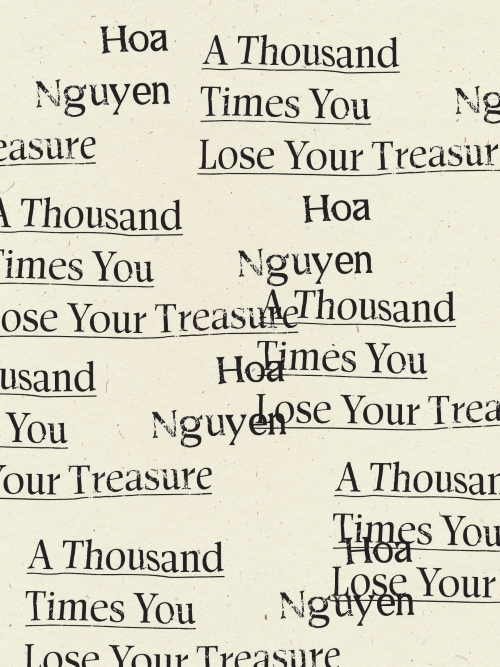I’m grateful for Hoa Nguyen’s A Thousand Times You Lose Your Treasure, which offers an argument for a more precise kind of lyric—one that fundamentally understands the power in the materiality of language. In its rigorous attention to the source material that lyric comes from, I can experience the disorientation that attends lyric without the anxiety that someone is pulling the wool over my eyes.
It helps that, from the first lines of the book, Nguyen engages explicitly with lyric and power.
yes a famous mis-en-scène
“when I was just a little girl”
angle looks too much like angel
and vice versa
It is a declaration of power for a poet of Vietnamese origin, writing in English, displaced by way of colonial empire and war to begin her book with a French phrase with origins in stage direction. Nguyen then quotes the first line of “Que Sera, Sera,” a word-for-word mistranslation of the Spanish, Italian, and French for “what will be will be.” And the slippage, sound, and repetition, then, from “angle” to “angel” makes the music for which the lyric gets its name.
The next four poems in the collection—“Ask About Language As If It Forgets,” “Naming Assembles You,” “ Language Points’,” and “Autonomous Song”—place us in the materiality of language itself and the form within which we receive it. Instead of lyric as wide open and untethered, Nguyen proposes a lyric of specificity, one that isn’t separate from but springs forth from the particulars.
The entire project of the book is placed in a hyper-specific history: her mother’s role in a daredevil motorcycle troupe in pre-war Vietnam. While the beginning sequence is about language—English, Vietnamese, and French—the book’s aperture is constantly closing in on other details. From Dow Chemical ingredients to Vogue and Current Affairs magazine articles, from Scooby-Doo to durian fruit, Nguyen’s repeated narrowing and insistence on focus produces an ongoing expansiveness that allows the book to be about more than its particulars, creating room to both reflect on itself and peer into the future.
How startling then to arrive at “Made by Dow,” a poem about an encounter, or rather a moment of recognition, with a white woman after a reading in which Nguyen read a poem appearing earlier in the book, “Napalm Notes.” It’s a narrative poem—one of the longest in the book. The speaker, presumably Nguyen, reflects and refracts every detail in characterizing the white woman and their interaction. And through the white woman’s observation—connecting the Bic lighter they shared with napalm—comes to a realization about language and metonymic metaphor that unfastens, frames, and nails to the ground the lyric experience.
From this seemingly endless nesting doll of details, Nguyen magnificently opens us up in an almost tessellation-like effect, zooming in in order to zoom out. In reading A Thousand Times You Lose Your Treasure, I was often reminded of Denise Levertov’s “Accuracy is always the gateway to mystery.” However, Nguyen provides—to this reader, at least—not just mystery, but a new orientation towards lyric and the capacity it has to contain where we sing from and “What We Sing To:”
wing a string we sing to
wing again




